Go vs. Rust Compared: Which is right for you?

If you're in the tech industry, you've probably heard the buzz around Go (A.K.A. Golang) and Rust. They're two of the hottest modern compiled languages out there, and for good reason.
Both offer incredible performance and are designed to solve the problems of today's software development landscape.
But here's the thing: they are not the same. Choosing between them is less about picking the "better" programming language and more about picking the right tool for a specific job inside a specific context.
The Go vs Rust decision can feel overwhelming, but don't worry. I'm here to break it down for you.
This guide will help you figure out which language is the best fit for your next project or the right next step for your career. Let's get to it.
Quick Recommendations (TL;DR)
I get it, you're a busy developer. If you only read one part of this article, make it this one. Here's the TL;DR on Rust vs Go in a nutshell.
Go with Go if…
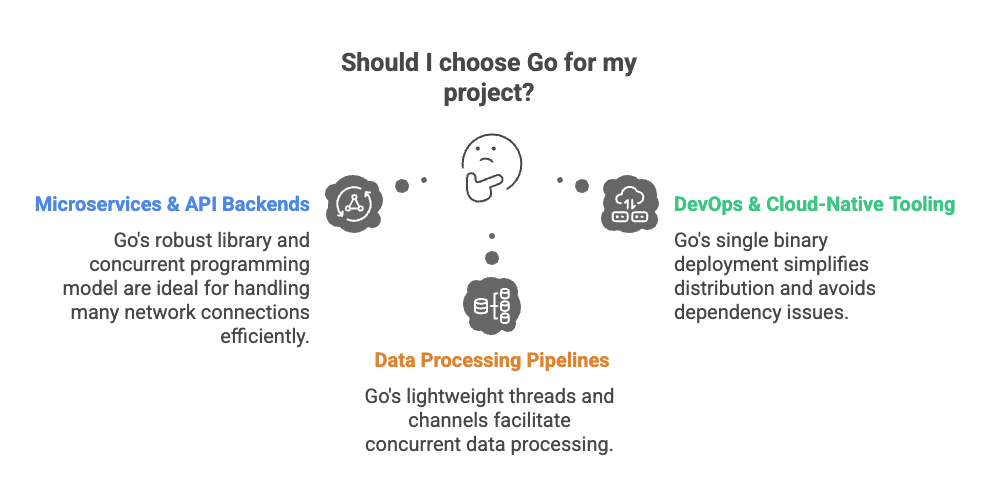
You’ll want to choose Go if your priority is development speed, simplicity, and building scalable network services.
Go is the programming language of the cloud. It's designed to be pragmatic, easy to learn, and incredibly productive for teams. We have covered everything you need to know to become a Go developer in our Go roadmap.
Let’s take a look at a few use cases that feel as if they were designed for Go:
Use Case: Microservices & API Backends.
Go was practically built for this. Its robust standard library gives you powerful networking tools right out of the box. More importantly, its model for concurrent programming, called Goroutines, is a game-changer.
You can handle tens of thousands of simultaneous network connections with ease, which is perfect for modern web services.
The fast compilation time and straightforward syntax mean you can build and ship features faster than the competition.
Use Case: DevOps & Cloud-Native Tooling.
Ever heard of Docker or Kubernetes? They're written in Go. The reason Go dominates this space is its single binary deployment.
Your entire application, runtime, and all, compiles into one single file. This makes distributing Rust programs incredibly simple.
You just copy the file and run it, no dependency nightmares!
Use Case: Data Processing Pipelines.
If you need to move a lot of data around, Go is a perfect candidate.
Using its lightweight threads (Goroutines) and channels, you can easily build concurrent pipelines that read from a source, process the data, and send it to a destination, all while taking advantage of all your available CPU cores. It makes complex concurrent logic feel simple.
Go with Rust if…
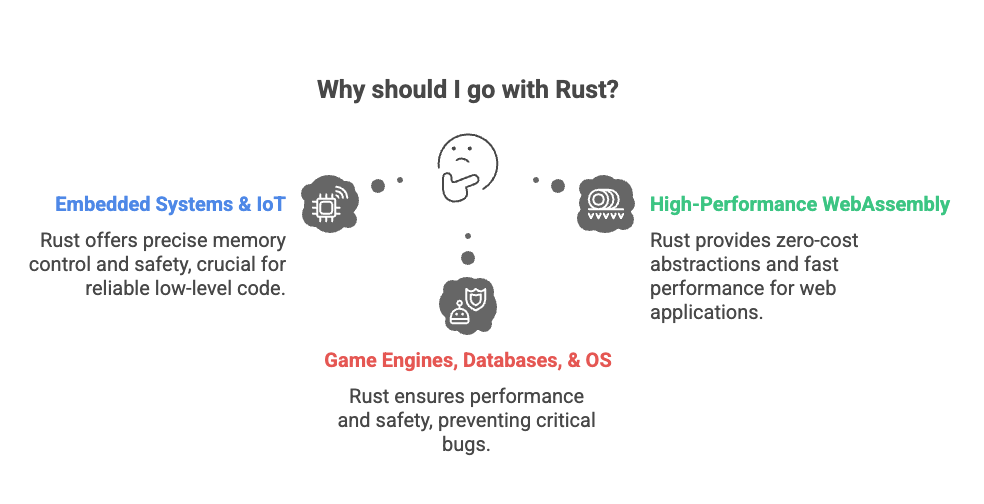
You’ll want to choose Rust if your priority is absolute performance, guaranteed safety, and deep control over your system.
Rust is for when "good enough" isn't good enough. It's for building foundational software that others can rely on to be both lightning-fast and rock-solid.
And if you like paradigms such as object-oriented programming, imperative programming, or even functional programming, then Rust is also a very interesting option, as it contains portions of them in its own vibe.
Willing to become a Rust developer? Check out our Rust roadmap and start your learning journey today.
So let’s now take a quick look at some use cases that are perfect for Rust:
Use Case: Embedded Systems & IoT.
On a tiny microcontroller with minimal memory, you can't afford a garbage collector. Rust gives you precise control over every byte of memory, just like C, but with a huge safety net.
The Rust compiler's famous borrow checker ensures you don't introduce memory safety bugs that could crash your device.
This is a massive, significant advantage for writing reliable low-level code.
Use Case: High-Performance WebAssembly.
Need to run a complex physics engine or video editor in the browser? JavaScript won't cut it. Rust's zero-cost abstractions let you write elegant code that compiles into tiny, highly optimized WebAssembly modules.
Because there's no garbage collection, the performance is predictable and blazing fast, enabling near-native speed for performance-critical applications on the web.
Use Case: Game Engines, Databases, & OS
In systems programming, performance and safety are non-negotiable. A random pause from a garbage collector would ruin a game's frame rate.
A memory leak or data race could corrupt an entire database or bring down an operating system.
Rust is one of the most powerful systems languages because its focus on preventing these bugs at compile time means you can build complex systems like these with a level of confidence that is simply impossible in most languages that don't offer the same guarantees.
Go vs Rust: Comparison Table
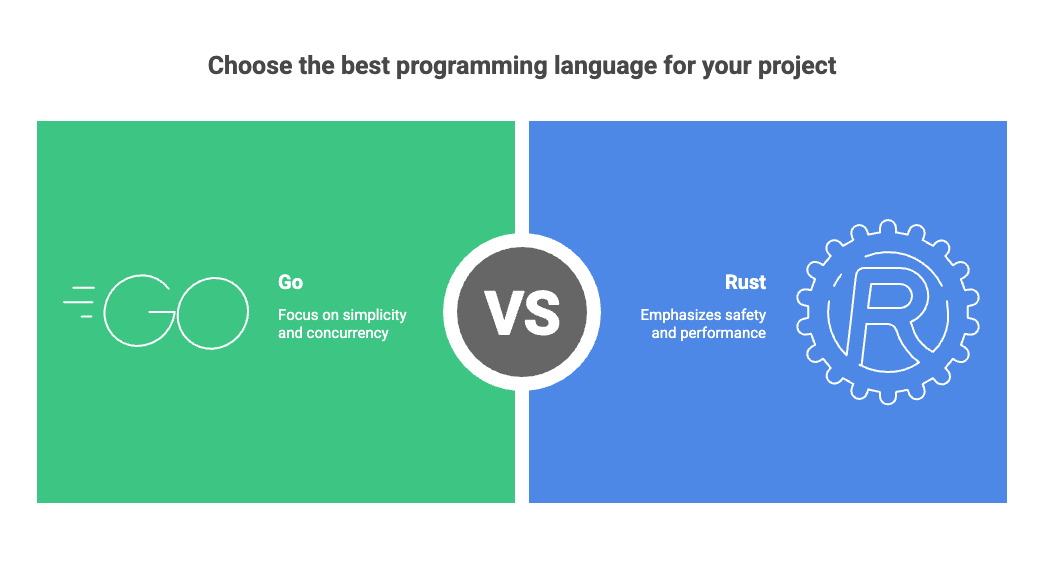
Here’s a more detailed breakdown of how the two languages stack up against each other. We're moving beyond the basics to see the real trade-offs here.
Feature | Go (Golang) | Rust |
|---|---|---|
Core Philosophy | "Simplicity is king." Prioritizes a small language, fast compiles, and makes rapid development easy for large teams. | "Safety without compromise." Aims to provide memory safety and control without sacrificing performance. |
Performance | Excellent for most tasks. However, the garbage collector (GC) can introduce small, unpredictable pauses under heavy load. | Top-tier and predictable. The lack of a Garbage Collector means you get consistent, low-latency performance, crucial for performance-critical applications. |
Memory Management | Automatic via a concurrent garbage collector. This is super convenient and prevents most memory leaks, but offers less precise control. | Compile-time ownership and the borrow checker. It's a steep hill to climb, but it guarantees memory safety without any runtime overhead. |
Concurrency Model | Goroutines & Channels. A brilliantly simple model using lightweight threads that makes writing concurrent programming feel easy and intuitive. | Async/await & Scoped Threads. More complex to set up, but the compiler provides powerful compile-time guarantees against data race conditions. |
Learning Curve | Gentle and straightforward. With its simple syntax and small feature set, a developer can become productive in a matter of days. | A notoriously steep learning curve. You're not just learning syntax; you're battling the borrow checker and learning a new way to think about memory. |
Development Speed | Very high. The fast compilation time, simple language, and robust standard library are all optimized to get your project from idea to deployment quickly. | Slower, especially at first. The strict compiler forces you to be very precise, which can feel tedious but often leads to less time spent debugging later. |
Error Handling | Explicit | Uses |
Best For | Backend development, cloud-native apps (Docker, Kubernetes), network services, APIs, and CLI tools. | Systems programming, embedded systems, game engines, browsers, and high-performance computing. |
When to Choose Based on Career Path
Choosing a language isn't just a technical decision; it's a career move.
Both Go and Rust open doors to exciting, high-paying jobs, but those doors often lead to different rooms in the house of software development.
The Go Career Path: Building the Digital Backbone
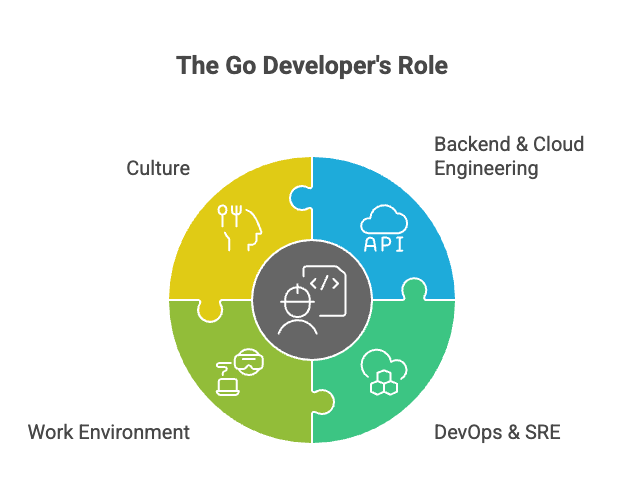
Think of the Go developer as the ultimate pragmatist, the engineer focused on building and scaling the services that power our digital world.
This path is less about reinventing the wheel and more about building a reliable, high-speed highway for data to travel on.
Backend & Cloud Engineering
This is Go's bread and butter. You'll be doing core backend web development and microservices that power web and mobile applications.
Your day-to-day will involve handling massive amounts of network traffic, writing business logic, and connecting to databases.
You'll lean heavily on Go's amazing concurrency features to build systems that are incredibly scalable and efficient without the complexity of traditional multi-threaded programming.
DevOps & Site Reliability Engineering (SRE)
You'll build the tools that other developers use to ship and maintain their code. The entire cloud-native ecosystem—think Docker, Kubernetes, and Prometheus—is built in Go.
Why? Go's fast compile time and single binary deployment make it a dream for creating portable CLI utilities and automation that works flawlessly anywhere.
Where you'll work
You'll find Go jobs everywhere, from scrappy startups building their first product to tech giants like Google, Uber, and Twitch scaling their massive infrastructure.
Any company that has a significant online presence needs Go developers for its backend needs.
The Vibe
The culture around Go is all about pragmatism and productivity. The mantra is "get the job done, and get it done well."
Because the language is simple, the focus is squarely on solving problems for the business, not fighting with complex language features.
Teams can achieve rapid development because the code is easy to read and maintain, making collaboration and onboarding new engineers a breeze.
It's a fast-paced, product-driven environment where your primary goal is to ship robust, scalable software that works. The gentle learning curve means you can become a contributor quickly and make a real impact.
The Rust Career Path: Mastering the Machine's Edge
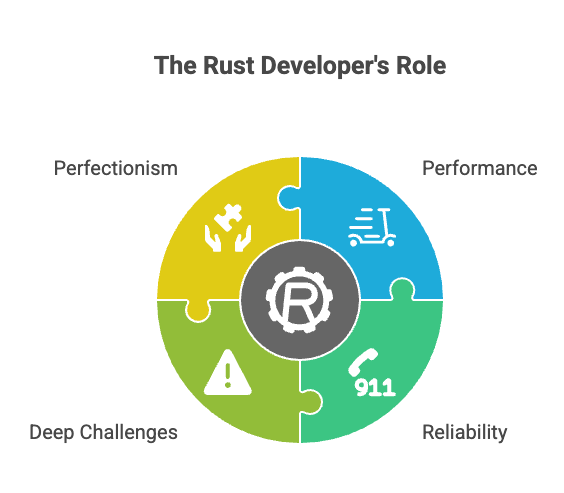
The Rust developer is a specialist, a craftsperson who works on the foundational layers of technology where performance and reliability are not just features—they are the entire product. This path is for those who love deep, complex challenges and want to write code that's as close to perfect as possible.
Systems Programming
You'll be writing the software that other software runs on. This could mean working on the internals of a database, building components for an OS, creating ultra-fast networking libraries, or even developing parts of a web browser.
In these domains, a bug caused by a memory leak or a data race can be catastrophic. Rust's borrow checker is a massive advantage because it prevents these errors at compile time.
Embedded Systems Engineering
You'll write code that runs on physical devices—think cars, drones, smart home appliances, and medical equipment. Here, you have limited memory and power, so you need precise control over system resources.
Rust is quickly replacing C/C++ in this space because its abstractions let you write safe, high-level code without sacrificing performance.
Niche, High-Performance Fields
You'll find Rust at the cutting edge of tech. In game development, it's used to build game engines where every nanosecond counts.
In FinTech, it powers high-frequency trading systems where predictable low latency is critical. In blockchain, it's used for writing secure and efficient clients and smart contracts.
Where you'll work
Look for Rust roles at big tech companies like Meta, Amazon, and Microsoft for their core infrastructure teams, as well as in the automotive, aerospace, and finance industries.
The Vibe
The Rust culture is one of craftsmanship and correctness. The community values getting things right, down to the last detail.
The steep learning curve fosters a collaborative environment where developers are passionate about teaching and mastering the language's deep concepts.
Your daily work involves thinking hard about memory safety, performance, and elegant API design. There's an immense satisfaction that comes from "winning the fight" with the compiler, because you know the resulting code is incredibly robust.
It’s a path for those who love the challenge of building foundational, high-performance systems and take immense pride in the quality and reliability of their work.
When to Choose Based on Project Type
The best way to settle the Golang vs Rust debate for yourself is to look at what you’re trying to build.
In the end, the technical needs of your project will have a direct impact on your technical decisions, including, of course, the programming language you decide to go for.
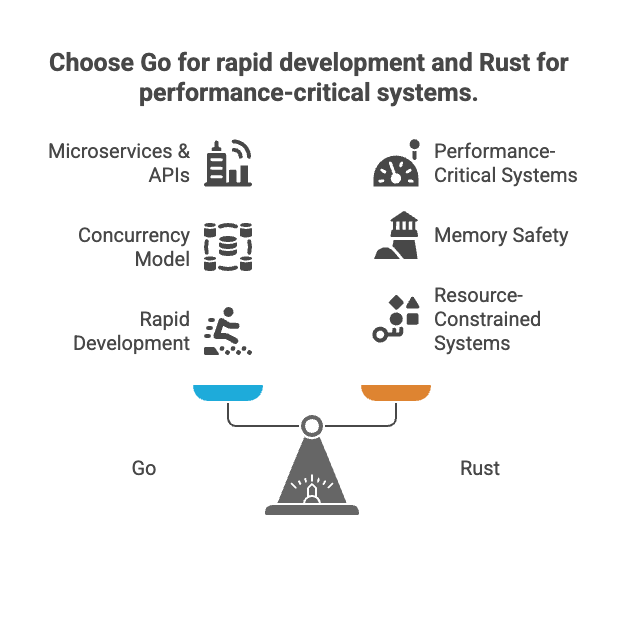
Choose Go for projects like...
Microservices & REST APIs
What it is: A fleet of small, independent services that talk to each other over the network to form a larger application.
Why Go is the right choice: This is Go's home turf. Its robust standard library comes with fantastic, production-ready packages for building HTTP servers. More importantly, Go's simple concurrency model with Goroutines is a perfect fit for handling thousands of simultaneous API requests. The language is designed to make it easy to write clean, scalable network code, allowing your team to achieve rapid development and ship new services fast.
High-Throughput Data Pipelines
What it is: A system that ingests, processes, and moves large volumes of data. Think of a log aggregator that collects data from all your company's servers and forwards it to a search index.
Why Go is the right choice: Go’s concurrency features are a natural fit for building these "conveyor belt" systems. You can easily spin up a pool of lightweight threads (Goroutines) to handle incoming data, another pool to process it, and a third to write it out, all communicating through channels. This makes it simple to utilize all your available CPU cores and build highly efficient, parallel systems without the headaches of traditional threading.
CLI Tools & DevOps Automation
What it is: Command-line tools for your developers or automation scripts that manage your cloud infrastructure.
Why Go is the right choice: The killer feature here is single binary deployment. You can compile your tool on your machine and get a single, dependency-free executable file. You can then distribute that one file to anyone on your team, and it just works—no need for them to install a runtime or manage packages. This is a massive advantage for building internal tools and is why so many popular DevOps tools are built with Go.
Choose Rust for projects like…
Anything Requiring Extreme, Predictable Performance
What it is: A video game engine, a high-frequency trading platform, or a real-time video processing service.
Why Rust is the right choice: In these scenarios, a small, unexpected pause can be disastrous. A stuttering frame rate or a delayed trade can't happen. Because Rust has no garbage collector, its performance is incredibly predictable. Its philosophy of abstractions (such as zero-cost) means you can write high-level, expressive code that compiles down into the most efficient machine code possible, giving you a huge advantage in performance-heavy applications.
Foundational Systems Software
What it is: The software that other software depends on. Think of a database storage engine, core components of an operating system, or a web browser's rendering engine.
Why Rust is the right choice: A bug in this kind of software can lead to data corruption or major security vulnerabilities. This is where the compiler and its legendary borrow checker shine. They act as a relentless partner, preventing entire classes of memory safety bugs at compile time. This allows you to build complex, highly-concurrent systems with the confidence that they are fundamentally safe and correct.
Resource-Constrained Embedded Systems
What it is: The firmware that runs on physical hardware like a drone's flight controller, a smart thermostat, or the electronics in a car.
Why Rust is the right choice: These devices have very little memory and processing power. You need precise control over every byte and CPU cycle. Rust is a perfect fit for embedded systems because it has no runtime or garbage collection, giving it a tiny memory footprint. It allows you to write safe, modern code that interacts directly with hardware, making it a powerful and safer alternative to C/C++.
In-Depth: Go Pros & Cons
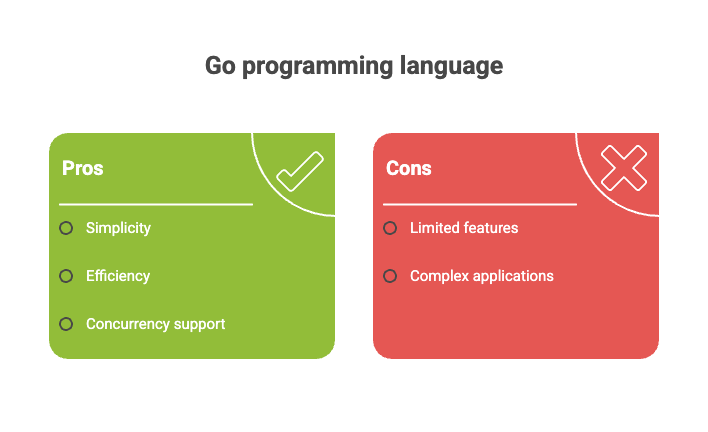
Let's be real—no language is perfect. Here are the trade-offs with Go.
Pros | Cons |
|---|---|
It's Simple: Go has a famously small spec. You can learn the whole language relatively quickly, making it easy for teams to get on the same page. | The GC Isn't Free: While convenient, the garbage collector can introduce small, unpredictable pauses, which is a deal-breaker for some real-time applications. |
Very Fast Compilation Time: Your development feedback loop is super short. You save, compile, and run in the blink of an eye. | Verbose Error Handling: The |
Concurrency is a Breeze: Goroutines and channels are Go's killer features. They make writing code that uses multiple threads, and all your available CPU cores feel almost trivial compared to most languages. | Simplicity has a Cost: Go intentionally leaves out some features from other languages, like complex generics (though they've improved!) and metaprogramming, which can sometimes make your code more verbose. |
No-Fuss Memory Management: The garbage collector handles memory allocation for you, which means you can focus on your app's logic. |
In-Depth: Rust Pros & Cons
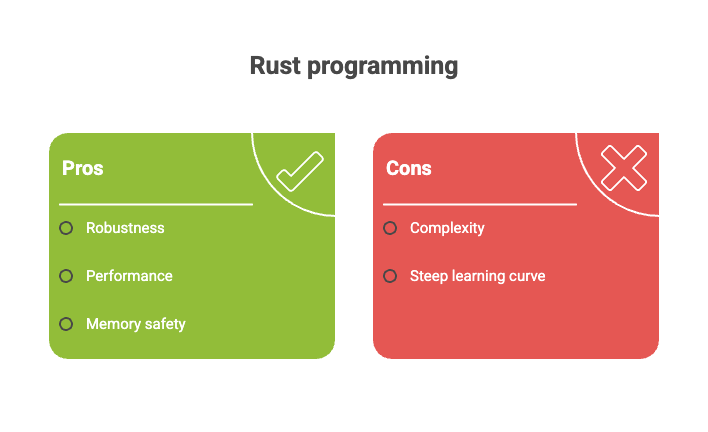
Rust is incredibly powerful, but that power comes with responsibility.
Pros | Cons |
|---|---|
Fearless Concurrency: The Rust compiler is your best friend. It guarantees at compilation time that your code is free of race conditions, which are some of the nastiest bugs in concurrent programming. This level of thread safety is incredible. | The Learning Curve is Real: Let's not sugarcoat it: learning Rust is hard. Fighting with the borrow checker is a rite of passage for every new Rust developer. The more complex syntax requires a real investment to master. |
Performance on Par with C++: Thanks to zero-cost abstractions, you can write high-level, expressive code that compiles down to incredibly fast machine code. You don't have to choose between elegance and speed. | Slower Development (At First): You'll spend more time upfront satisfying the strict Rust compiler. The trade-off is that once your Rust code compiles, you have a much higher degree of confidence that it's correct. |
Total Memory Control: Rust gives you manual-level control over memory without the risks. You'll never have to hunt down null pointers or worry about dangling references, preventing a whole class of security vulnerabilities. | |
A+ Tooling: The Rust ecosystem is amazing. Cargo, its build tool and package manager, makes managing dependencies a joy. |
Final Recommendations & Decision Flowchart
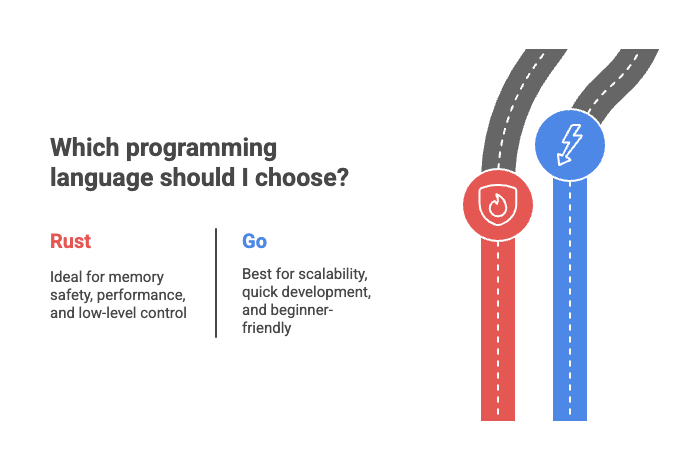
Still don’t know what language to pick? I’ve put together this simple flowchart. Try to answer these questions to find your path.
Is guaranteed memory safety & max performance the #1, non-negotiable priority?
YES -> You're building for reliability and speed. Choose Rust.
NO -> Go to step 2.
Is your main goal to build scalable web backends or network services as quickly as possible?
YES -> You value productivity and speed to market. Choose Go.
NO -> Go to step 3.
Are you working at a low level (e.g., embedded, OS kernels, game engines)?
YES -> You need that low-level control. Choose Rust.
NO -> Go to step 4.
Are you a beginner looking for your first modern backend language to get a job?
YES -> You want a faster path to being productive. Choose Go.
NO -> Your use case is specialized. Re-evaluate. If you lean towards performance and control, pick Rust. If you lean towards simplicity, pick Go.
Final Conclusion
At the end of the day, the Go vs Rust debate isn't about a winner or a loser. It’s about a vibrant software development industry that has produced two incredible, specialized tools.
Rust and Go are both fantastic programming languages, and each one shines in its own special way. Go prioritizes developer happiness and speed, letting you build robust systems with ease. Rust prioritizes ultimate correctness and performance, letting you build fearless software that's both safe and blazing fast.
The best advice I can give you? If none of the above has helped you to make the final decision, try building the same project using both languages, something simple, don’t overdo it. Maybe a simple web server or a set of CLI programs.
Seeing how each language approaches solving the same problems will tell you more than a thousand articles.
Whichever path you choose, Roadmap.sh is here to help you. Check out our top-class Go roadmap and Rust roadmap, and start your learning journey in one of today’s most in-demand programming languages!
 Fernando Doglio
Fernando Doglio